This Is How to Create a Facebook Group with 1k+ Members
(8 Best Practices)
No one can deny the fact that Facebook is a goldmine for marketers. While having a Business Page is a must for modern businesses, there is nothing like your own group to enhance engagement and direct communication with your audiences and buyers.
Such communities serve as powerful tools for reaching new audiences and rallying your people.

In essence, Facebook groups present brands with an opportunity to create fan communities to connect and engage in a way that was not plausible until a few years ago.
Especially after Facebook updated its algorithm that gives less importance to the brand content relatively, these groups have turned to be even more imperative for connecting with the followers of a brand.
Brands have relished substantial success from forming and growing their own Facebook groups. It plays a major role in the everyday user experience. Above all, it’s a cost-effective way to reach your audience without making a lot of effort.
Are you skeptical about creating a Facebook group or fretful about maintaining one? Then, you don’t have to be uncertain about it anymore.
Are you ready to incorporate Facebook groups in your social media marketing plan?
This post can help you understand what Facebook groups are and the effective strategies to make them work for you.
Chapter 1:
What Is A Facebook Group And Why Should You Care?

A Facebook group is a space on social media platforms that a community shares. It can include acquaintances, friends, or people with similar activities and interests who discuss narrow or broad topics.
These groups serve as a platform for group communication, where people can easily share and express their opinions. Any user can join the Facebook group if they are open to the public, else they need to be invited to join one.
Facebook groups allow users to interact based on common association or affiliation. They are an arena that promotes organic discussions and topics. These groups can also be used to endorse your products and services while giving you an opportunity to nurture brand awareness.
Any member can create and manage a Facebook group. Unlike Facebook pages, groups are not formed to maintain the online Facebook presence for an entity like a celebrity, business, or brand.
This presents an opportunity for business owners to increase the visibility of their group as well as manage your community. Facebook projects that 1.4 billion individuals use 10 million Facebook groups on a monthly basis.
Facebook groups are trending more than ever and for the right reasons, especially for businesses who want to engage with their online audience and tailor the content to their interests.
Furthermore, these groups can also help you grow your targeted email list. Facebook groups are a powerful tool that lets you gauge your audience’s interest and post relevant content for them. It’s an ideal space for you to inspire, motivate, and inform your audience while increasing engagement.
Therefore, it is imperative for businesses to have an exclusive support forum that can help you ensure customer acquisition and drive your retention strategy. Additionally, it enables you to build a community with new members and discussion threads.
Chapter 2:
How To Create A Facebook Group (Step By Step)?

Now that you know why it is important to consider creating a Facebook, it is time to understand how to create a Facebook group. Before you have all your dedicated followers in your Facebook group, you should probably know the way to create one.
It’s pretty simple to create a Facebook group.
Here is a step by step guide on how to create a Facebook group.
Step 1. You can navigate to the “Create” button that you can find on the top right of your Facebook profile and select “Group.”
Step 2. Then, choose the group type, i.e., are you a team, club, or something that best describes your respective group’s category.
Step 3. Decide a name for your group that is easy to relate to and find to ensure your group’s visibility.
Step 4. Choose your privacy preference, which typically has the following options:
- Open – groups that are open are entirely accessible to the public. Facebook users can simply get into the group by clicking the “Join” button. Also, the posted content and group posts are visible to everybody.
- Closed – your group has closed settings by default. Anyone can see this group and the specific members, but the content and posts are only available to the group members. People who wish to join the group can send in the join request to the group, but admins have the right to approve or decline the requests before the group info is available to the requesters.
- Secret – groups that are virtually invisible to Facebook users who are not added to that group.
Step 5. Click the “Create” button.
Step 6. You can now customize your Facebook group with a suitable description and a cover photo. Make sure the purpose of your group is stated and the policies regarding membership and behavior.
Once you have created a group using the above method, you can include your business page on Facebook as a page admin.
Chapter 3:
What Are The Benefits Of Building A Facebook Group As A Business?

With so many forums and options to enhance your online presence these days, it is imperative to understand the value of each possibility and see if Facebook groups are worth the investment. As a marketer, the first question you may think of will be “if it will have a positive impact on ROI?
If you are still perplexed on why you should pay attention to these groups, here are some benefits of facebook groups that help you achieve your business objectives.
Personalize Your Brand And Tailor Your Content
Facebook groups are different from a Snapchat account or an Instagram page in terms of maintenance. It allows a relatively higher level of engagement with participants.
Facebook groups are specifically designed to prioritize discussions and interaction, so it allows your business to build a community that your audience can relate to. This, in turn, shows your audience that you truly value and care for their opinions and thoughts.
And suppose you can make them feel truly heard. In that case, they are likely to consider your business superior compared to your competition.
Foster Long-Lasting Relationships With Your Audience
Facebook groups are remarkably useful when it comes to your social media marketing strategy. They can have a significant impact on how you devise your plan. Brands that revolve their group’s content and post around their customer’s interest topics can make your brand more valuable to them.
Consider your digital sales funnel – you wouldn’t want customers to purchase just once. You want them to build and maintain lasting relationships with your customers that reduce churn rates and, ultimately, drive business growth.
Use your Facebook group to connect with your customers and understand their preferences and pain points, which can help you get familiar with some of the best ways to handle a conflict.
Furthermore, you can have one on one interaction with your customers and get to know their expectations from the brand, which is vital to increase your rapport.
Improve Your Organic Reach
In 2018, Facebook introduced an algorithm called “Facebook Zero.” Put simply, it is the reason why you get to see the most dominating group content on your newsfeed.
Brands often underestimate the significance of organic marketing. However, organic reach is the basis for an effective ad strategy. Every successful advertising campaign rests on a creative and consistent online presence that helps you strengthen your brand.
People prefer to have discussions with friends, family, and groups of people they identify with. That explains why Mark Zuckerberg, the founder of Facebook, rolled out an algorithm that frequently shows posts from groups and on top of their newsfeed.
Therefore, group content has substantially better organic reach as compared to the standard Facebook Pages. The high performing content on Facebook groups is said to have a reach of 5.20%.
The content on Facebook groups guarantees a considerable impact on your reach and engagement of posts and is a powerful way to improve your organic reach. Your content can get notices and drive meaningful results for your business.
Chapter 4:
Ways To Grow Your Facebook Group

Facebook Group undoubtedly one of the best digital channels to connect and engage with your audience frequently. If you want to construct your digital tribe, Facebook groups are ideal for interacting with your audience base.
One of the examples of this is our own Facebook group, the B2B Demand Generation group.
Our approach to getting more people to join in and increase the engagement was that he initially shared the group with people in UpLead’s network.
He did this through nurture sequence, an automated email series for existing clients and subscribers to drive them to take the intended actions. This helped him grow the group, that too, with the right audience.
But this is just one of the many ways to grow your Facebook group. At the end of the day, the perfect approach to get more engagement is to be real. So here are some of the practical ways that can help your Facebook group.
Set Crystal Clear Rules And Expectations
The essential piece of information on your Facebook Group is the ground rules you introduce to maintain its integrity.
While it sounds like much of a hassle, it’s vital to keep your group from transferring into a space for spamming.
It is crucial for starters to ask yourself: what are your objectives, expectations from members, and the ground rules based on which members should engage?
Detailed rules and meaningful conversations go hand-in-hand. This also helps you minimize the chances of disruption in the group as you can tell members to adhere to the established rules. Encourage them to read and follow the rules so that the group maintains its fundamental nature.

Source: Facebook
Don’t just define the rules for members to read. It is also pivotal to enforce them. Your group should be welcoming and safe for members to interact with. Also, setting healthy boundaries will limit self-promotional links and spammers.
This example for Dogspotting Society communicated the group rules in an interesting way that aware the members of the group’s dos and don’ts.
Connect With Influencers To Make Them Join Your Group
Get the right influencers to connect to your group, and you can effortlessly convince others to join it as well because now you have solid social proof.
You can implement the cold outreach approach to make the influencers and bloggers join your community. Empower them to advocate for you and your brand. This is yet another way to spread the word about your business groups on Facebook in an authentic way.
Furthermore, they also influence other people in their fan base to connect with your group when they share your content on their official pages or lets their followers know that they have joined a particular group.
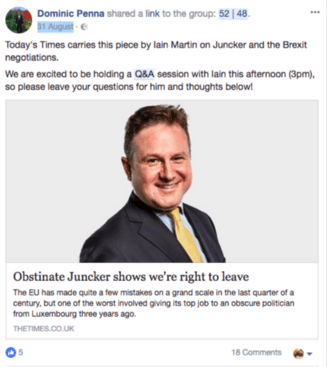
Source: Medium
A good Facebook group provides value to the audience for joining it. It should be a platform where they can find authoritative content. And partnering with popular journalists can help create a strong community with informed members.
The above example by 52|48 stands out from the rest by letting the columnists discuss with members.
Optimize Your Content And Group For Engagement
Just like you pay attention to what helps you increase the engagement rates, the same rules are applicable for your overall Facebook Group.
Therefore, it is essential to fill out your group information and include the relevant keywords your audience might relate to. Additionally, add the benefits in your group description, a suitable call-to-action, and a visually appealing cover photo.
Covering these elements makes your group more discoverable and enticing to the existing as well as the prospective members.
It’s crucial to gauge the content that performs well with your audience on Facebook to tweak your content strategy in order to get the desired response and results. Facebook analytical tools can help you better understand how responsive members are to the group’s content.
Our Facebook group is a good example to follow as it centers on the lead generation approach. It’s a community with more than 1.8K members that invites sales leaders, marketers, and entrepreneurs, and helps them connect with other business professionals, learn new marketing strategies.

Source: Facebook

Source: Facebook
Another example, the followers of Drunk Elephant, a skincare company, created a group known as Drunk Elephant Skincare Addicts, which has 5.3K members who share and discuss their beauty routines and anything related to skincare.
Include A Link To Your Blog's Menu
One of the simplest ways to entice the right people to connect with your Facebook group is by adding a link to your group in the main navigation menu.
The audience on your website is, in all possibility, the right people to target as they came to read your blog. There are higher chances that they would want to explore more about your business and are likely to become a part of your Facebook group.
Keep Your Members In The Spotlight
Even though you initiated the group, it should revolve more around the members and not your business. The golden rule is to get your audience talking. The more keenly your members participate in the group activities, the better it will be for your Facebook engine.
You can warmly welcome the new members and ask them to give a short introduction of themselves. Additionally, you can give shoutouts to the group members to acknowledge their contributions or achievements.
Critique the group posts as an expert and assist the members with references if needed. Create relevant threads and tag members to encourage healthy discussions among the community.
However, be mindful that you don’t hijack their conversations. Rather try to be an involved listener. You can gather valuable indicators by tracking talks, which can help you manage your next content idea or product line.
Make sure that you don’t overlook the subscribers in your email list. You can craft an appealing welcome email to invite them to join your Facebook group. These emails do wonders if they provide the recipient with a genuine reason to convince them what value your group has to offer.
You can use tools like Mailchimp or Constant Contact to achieve this. These are two of the most common email marketing services and come with email segmentation features as well as integration with lead ads social media platforms such as Facebook, which makes it easy to invite specific subscribers to your Facebook group.
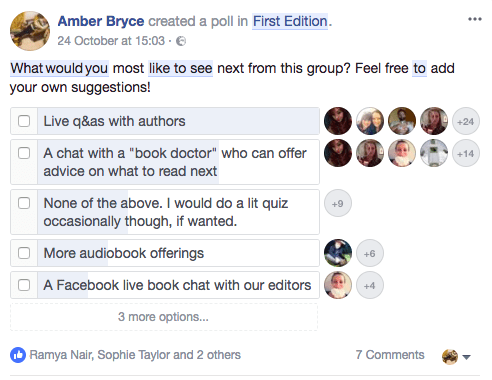
Source: Facebook
First Edition, a group on Facebook, created a poll to ask the member’s preferences for the upcoming topics they would like to discuss.

Source: Facebook
Yet another one from the same group, getting to know its members so they can align the talks with their choices.
Link It To Your Business's Official Facebook Page
Business pages on Facebook have become nearly outdated due to the substantial decrease in organic reach.
However, it is still helpful to have your business page on Facebook for multiple reasons. It can be an excellent way to boost your Facebook group’s visibility and growth. All you have to do is link your Facebook group to your official business page on the same platform.
That way, the “groups” tab will show on your page, and your audience will know that you have a group too, and they can easily access it by clicking on that tab.

Source: UpLead
If we look at our own Facebook group example again, we have linked the B2B Demand Generation group on our official business page “UpLead.” Our followers on that page can also join and benefit from the group.

Source: Barked

Source: The Barked Club
Another example, the group “The Barked Club” has incorporated the “Visit Group” option on their official Facebook page to entice the followers to join their group.
Prioritize Discussions And Keep It Interesting
It is imperative to prevent your content from getting stagnant and stale. For that, you need to keep experimenting with different content formats to understand what works well for your group.
You can try different themes on different weekdays, such as “Motivational Monday,” and then post the content relevant to that particular theme.

Source: CloudTalk
Furthermore, you can also conduct giveaways and contests in effective ways to spur on activities in the Facebook groups. Similarly, podcasts and live question and answer sessions can also propel discussions and engagement.
You can also collaborate and partner with influential group members and persuade them to share their trade tips and answer related queries.
Additionally, quizzes and polls are a big hit when it comes to Facebook groups. You can carry out surveys and motivate participants to tag their friends interested in filling the survey. This way, you can expand your reach and drive engagement.
B2B Demand Generation group does a great job in keeping their members engaged by conducting weekly events and sessions with interesting topics that gets the audiences’ attention and hooks them to the group.

Source: The Barked Club
The above example of The Barked Club tries to engage the Facebook group by introducing a “TongueOutTuesday” for its members to share their dog pictures.
Since your time and resources are limited you need to prioritize the initiatives that work.
Link Your Facebook Group In Other Groups
Most businesses that utilize Facebook groups to grow their traffic can leverage other groups’ power if used appropriately.
Daily threads are a stellar way to increase engagement and keep the members active on the Facebook groups. Some of those groups also let you post promotional ads of any type on particular days.
This can be highly beneficial for you to promote your group by telling a little about what it is and how it can help the audience.
But be mindful of the group rules thread and make sure that you follow it before posting about your Facebook group. This approach works exceptionally well for Facebook groups, especially if they have an audience related to yours.
To captivate your target audience’s attention, write about your group, and add the link to it. It should intrigue them to open the link and make them click on “join group.”
Chapter 5:
4 Best Practices To Increase The Number Of Members

While a Facebook group can be extremely valuable to your marketing efforts, leverage it in a way that can help you discover and reach a new audience, and ultimately strengthen your community.
Naturally, just forming a Facebook group is not a magic bullet that will entice your target audience to join the group. And for that, you need the right approach and implementation that can propel the promotional strategy.
Here are some of the best practices that can help you increase your Facebook group members.
Name Your Group Correctly
First and foremost, it is vital to name and position your group correctly. You need to use the right keywords that compliment your business or brand as well as position it correctly. When you do that, Facebook automatically suggests you, free potential members for your group.
But remember, don’t choose a name similar to your services or business. Instead, focus on building a community that helps you bond with your ideal audience on the mutual interest they share.
For instance, if you want to target news moms, you can initiate a group that revolves around parenting, fitness, or time management.
When it comes to your group’s name, the “WHAT for WHO” tactic can also help you.
- WHAT: Society
- WHO: Spiritual Entrepreneurs – Spiritual Entrepreneur Society
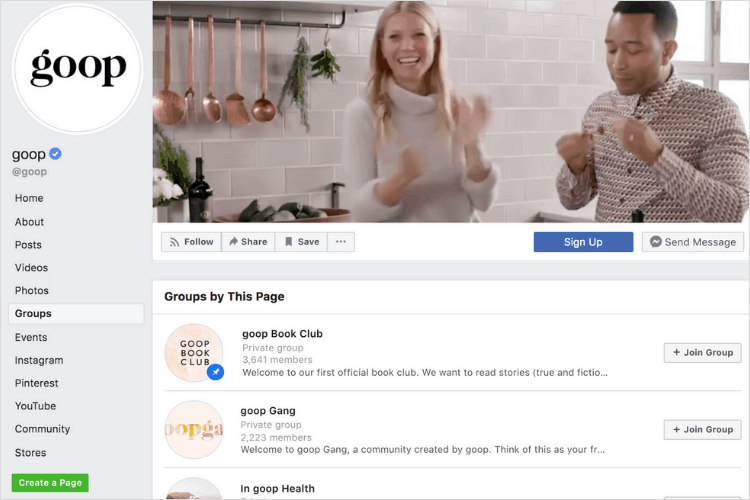
Source: Goop
For example, you can form a group committed to a specific thread of discussion or product line, like goop Book Club.
Intrigue The Audience With Teasers
One of the effective ways to increase your Facebook group participants is to post teasers about future group activities and events. This tactic can help you get more members to connect to your group.
For example, you can inform the people of an interview event with an expert and invite them to join if they wish to hear more on the topic.
Also, try hosting a Facebook live session, making an event-related post on your official business page, or even sending out emails to your targeted list. Using an email finder can also help you discover the relevant contact information of prospects and expand the group’s reach.
Run Challenges
Running group challenges can help you increase the number of members of your Facebook group. Online challenges can help you get hundreds of thousands of new participants in a few days.
A common challenge in a group is where you take people through a cycle of certain steps for a set time period. When people join in the challenge, they take a contest to complete an activity, achieve a goal, share an experience, or even master a new skill.
Challenges intrigue the participants to become members of the group and ultimately join the ongoing activities in the group. And they get enticed to get into the group to enjoy the exciting challenges.
It’s a cost-effective and ideal way to establish your Facebook group as an expert and strengthen your Facebook community without spending on Facebook ads.
Provide Exclusive Resources
When it comes to increasing your Facebook group fans, it is crucial to give your audience a reason or motivation to join your group. In short, what value they can derive by joining your group.
You can provide the targeted audience with exclusive resources like templates, videos, checklists, etc., to induce them to join.
Promote these resources by advertising them as your group description or anywhere else your audience is more active. For example, your brand’s page on Facebook.
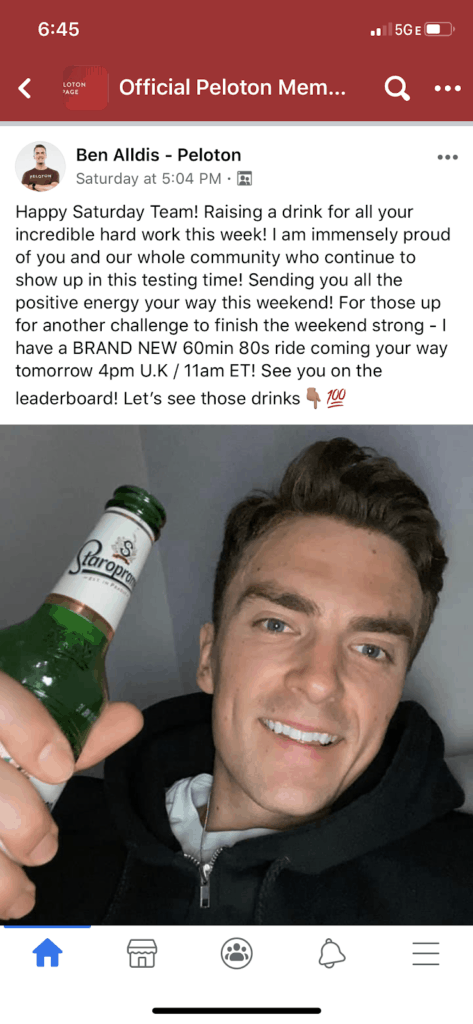
Source: Official Peloton Member
Peloton does a phenomenal job with the group content on their Facebook group known as Official Peloton Member, which frequently has trainers sharing exclusive fitness content.
Chapter 6:
4 Best Practices To Drive Engagement

Social media engagement can positively impact your brand’s value if done correctly. When you build a community, you get new followers who can eventually help you accomplish your long-term business goals.
Increasing community engagement is critical to maintaining a successful group. Your audience will want to engage if they have a strong passion for your business or anything your group is based on.
Higher engagement also allows you to explore new opportunities to generate leads, convert them, and deliver favorable outcomes.
Invest time and resources to your Facebook group in order to drive the engagement levels, which requires you to strategize your execution.
Here are some of the best practices that can help you augment the engagement rates in your Facebook group.
Keep Your Content Consistent
Consistency is critical to building and maintaining interaction. Remember, your Facebook group is created to evolve into a community of people who share a zeal for any common goal. So this goal should align and resonate with the posted content.
A surefire technique is to remain consistent with your content strategy. This, in turn, will help you attain a higher level of engagement, and you can connect with each member.
When you practice consistency with your content while sharing unique posts, you will be rewarded with a Facebook group that never stops growing.
Participate In Discussions And Ask Questions
Another effective way to drive engagement is to make the members participate in discussions by asking them questions or their experiences regarding specific topics. Let them know that they can have meaningful conversations and share their views on the ongoing talks.
But don’t just ask a question and leave the participants to engage on their own. It is imperative to build a rapport and understand your members on a personal level. Have a conversation with them and respond to the member’s comments.
Furthermore, you can ask for their views on business-related matters or trending topics, tips, opinions, product preferences, reviews, or even run daily challenges or polls. That way, they will respond while increasing engagement. At the same time, you can get their feedback and thoughts.
When you create organic and authentic relationships with your audience, it makes them feel more connected and consider themselves part of the community. Therefore, they try to be more involved in group-related activities.

Source: The Library of Congress
You can ask your members questions like The Library of Congress did and see what kind of content they are more interested in to keep them engaged and connected.
Less Text, More Visuals
It is good to focus more on the visuals and add images to your posts. 32% of social media marketers consider visuals as the most effective form of content for their brand. But don’t worry, you don’t have to be a design expert. You can use tools like Visme to get access to thousands of design templates.

Source: Visme
Naturally, eye-catching and visually appealing content tends to drive more engagement. This is why Facebook came up with the new update that enables users to update their text statuses with colored backgrounds and pictures.
Additionally, 70% of businesses invest in visual content marketing strategies for this reason. You can also opt for live videos that have a 4.3% engagement rate on Facebook as compared to non-live videos. Humanize your Facebook group, and it can help you augment the engagement levels.
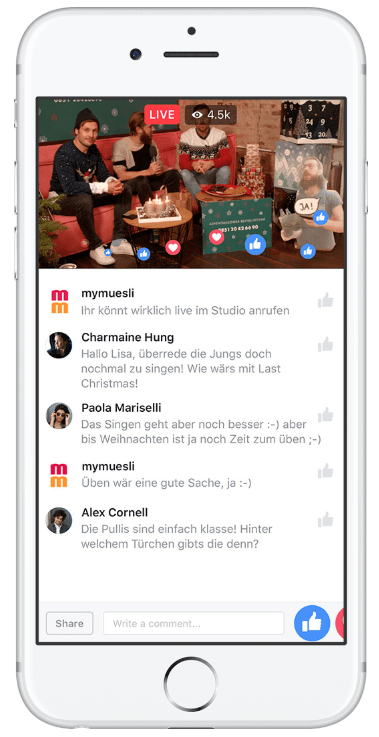
Source: Mymuesli
Mymuesli, for example, used Live video on Facebook to promote their advent calendar. And interestingly, the video got viewed 34,000 times.
Post Meaningful Content
Sharing meaningful and exclusive content that people can’t find on any other social media platforms. It’s a great way to reward your group members with valuable content.
This allows your audience to know about your business, as well as motivates the members to take part in the discussions and check the group often.
Additionally, provide your members with incentives that compel them to stay and engage in the group. It also lets you establish your authority and position in your field.
Your audience knows that they can get useful information about trending topics from your group. This will make them want to participate in discussions and express their opinions, too.
Ready Create a Facebook Group?
The bottom line is Facebook groups is an all-inclusive tool for brands to connect and communicate with your potential and existing customers.
They can also be an effective means to help you get your brand message across to niche audiences. Growing a Facebook Group might seem intimidating at first. But all it takes is patience, time, and a little effort on your part once you know how to create a Facebook group.
While people can’t easily find the Facebook groups organically, a strategic, well-rounded approach can help you create consistent and quality content. This, in turn, can increase the number of members on your Facebook group, propelling growth.
Even though you can find a number of great customer acquisition tools, businesses are leveraging Facebook groups for lead generation and nurturing customer relationships. If done strategically, Facebook communities can deliver remarkable returns.
